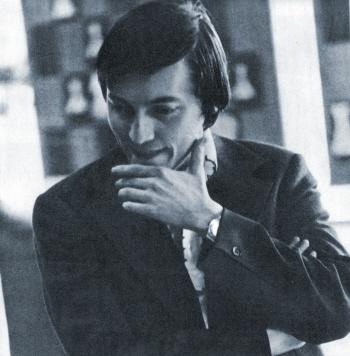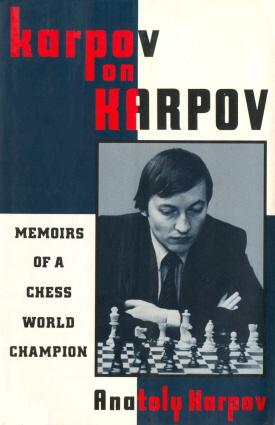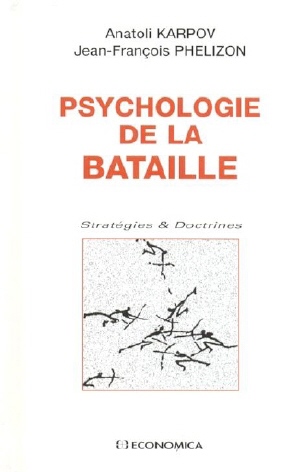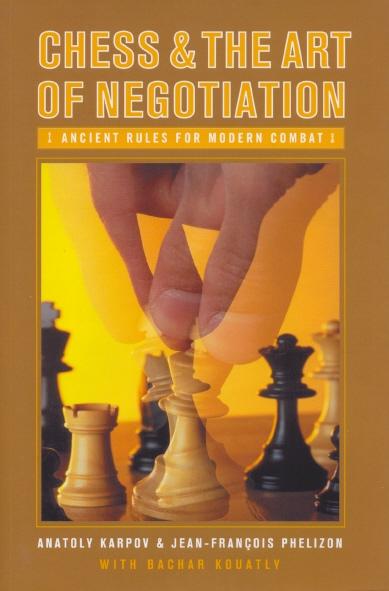
Edward Winter
(1985, with additions)

Anatoly Karpov
Karpov’s reputation as a sportsman is currently straggling on the back rank [see the Endnote below], but his recent Pergamon book Chess at the Top (translated, needless to say, by K.P. Neat) is a reminder that he is an entertaining annotator. The notes are fairly extensive and the world champion (if that is what he still is) is not chary about admitting error (‘I began playing rather superficially ... I began engaging in unnecessary subtleties’) or about praising a distasteful adversary (‘In a difficult position Korchnoi defends resourcefully. Few understood the point of this move, and it was only later that I appreciated its virtues’). Most of the games (they cover the period 1979-1984) are well known, inevitably, but we had seen few of them before with Karpov’s notes.
If Chess at the Top is good without being remarkable, Learn from Your Defeats is bad without being excusable. We do not wish to dwell too much on Batsford’s most unfortunate production; other critics have already catalogued its defects. How is either Karpov or the reader to learn anything from a game such as the 85-move meeting with Balashov (Rostov-on-Don, 1980), which has a single (14-word) note? Karpov’s loss to Ribli at Amsterdam the same year is showered with one seven-word note at move 20 and one variation (‘40...Rf2 fails to 41 Nd8.’). His defeat by García Palermo (Mar del Plata, 1982) in 57 moves is annotated with one bare comment, after move 27: ‘We could have repeated the position three times here, resulting in a draw.’ (Dubious grammar, too ...)
Some games are annotated by other masters, which raises questions about the extent of Karpov’s involvement in the book; in his notes to one game (page 57) Larsen writes: ‘Somewhere, maybe move 17, Karpov gave a3 as better.’ The fact that this vague statement exists in a book that purports to be by Karpov clearly suggests the Soviet player took a back seat.
The standard of the English translation is about the most feeble we have seen. For instance, here is how three of the chapters open: 1978: ‘Quite a bit has been written about this long, gruelling and nervous match.’ 1980: ‘I played quite a bit this year ...’ 1982: ‘This year I played quite a bit ...’ Translator: Eric Schiller.
Had it been handled with care, a similar project could have led to a fine book since the idea of giving Karpov’s losses and his later victories against the same opponents is good in itself. To work, however, detailed, personalized notes would be indispensable. For Batsford to give their book a general title that may attract the reader hoping for guidance in improving his own play is sheer impertinence.
(975)
Endnote: The above item appeared in the May-June 1985 issue of Chess Notes. Concerning the remark about Karpov’s sportsmanship, we added the following on pages 269-270 of Chess Explorations:‘The remark about Karpov’s poor reputation, made in the immediate aftermath of the termination of the 1984-85 Karpov-Kasparov world championship match, was certainly accurate, but increasing doubts arose about its justification, chiefly because of Hugh Myers’ assessment in C.N. 1007 (which was debated by John Nunn, Harry Golombek and B.H. Wood in C.N.s 1020, 1061 and 1079) and the large number of untruths that emerged from Kasparov’s camp.’
After the disastrous Learn from Your Defeats Batsford have published another book under Karpov’s name, Miniatures from the World Champions. Harry Golombek, in The Times of 6 July 1985, page 14, declared himself ‘disappointed and dismayed’ by it, adding that it ‘turns out to be written by one Eugene Gik and rewritten to a certain extent by world champion’.
Leaving aside the question of authorship (on which we have no information, only suspicions), we must admit that it is a difficult book to assess. There is some deep material (i.e. the Bird-Morphy analysis in chapter one) but most of the rest is superficial. Capablanca is supposed to be Karpov’s greatest hero, yet the relevant chapter contains nothing that is not to be found many times over in the standard works on the Cuban (e.g. the Panov collection).
Not all the games are miniatures, even by the book’s own generous ceiling of 30 moves; nor are all by world champions. At least the translator is K.P. Neat and not Eric Schiller.
Since the book deals almost exclusively with familiar material one would not expect factual errors. However: Page 3: Maróczy’s was hardly the first book on Morphy, which Batsford should know, having published a reprint of Löwenthal’s earlier one. Page 17: A quote which Pillsbury wrote ‘in his autobiography’. What autobiography?? Pages 43-44: three times the 1916 Lasker-Tarrasch match has the incorrect label ‘world championship’, even though just before there is a reference to ‘their unofficial return match’. Page 60: Alekhine was not awarded ‘the’ brilliancy prize for his New York, 1927 game against Marshall. Page 63: It is not mentioned that the Alekhine-Mindeno game is from a simultaneous exhibition or, more importantly, that the combination is unsound. (See CHESS, August 1975, page 328, or the BCM, February 1983, page 69.) Page 66: regarding Nottingham, 1936: ‘It is difficult to recall another event with the simultaneous participation of five chess kings ...’ What is one to make of such a statement given that Karpov himself, as mentioned in C.N. 285, has participated in two such events? Readers will decide for themselves whether a) Karpov is guilty of a double oversight or b) the above quote supports Harry Golombek’s claim that Karpov is not the real author of Miniatures. Page 70: The Alekhine-Consultants game was not played in Poland but in Palma de Mallorca. Page 123: ‘soon after’ with reference to the Fischer miniature should read ‘shortly before’. Etc. etc. ...
As we wrote in the August 1984 CHESS (page 114): ‘The mysterious function of the major companies’ chess advisers is all too often apparently restricted to providing commercial counsel rather than verifying accuracy or finding somebody who will.’ But even if somebody at Batsford had done a proper job on factual matters, would Miniatures from the World Champions have merited publication? With the exception of a few pieces of substantial analysis the book could have been put together by almost anybody.
(1027)
Anatoly Karpov: The Open Game in Action and The Semi-Open Game in Action (Batsford, £7.95 each)
Nigel Freeman (Berkhamsted, England) contributes the following review:
‘Seeing the advance notice of a series of “Games in Action” written by Karpov and published by Batsford, one’s immediate reaction (or, at least, my immediate reaction) is to wonder what is going to be foisted this time upon the gullible chess book buying public through the use of a big name. Having read the first two titles, I realize that I was wrong. In the introduction, Karpov tells what sort of books they are: “... First of all, these books are a selection of grandmaster games from the past few years with interesting opening ideas. ... Secondly, the books are a selection of opening discussions that are devoted to the most critical openings, variations and plans played by grandmasters during the past few years. ... The third aim of these books is to be an addition to the selections of the games of the twelfth world champion during the years 1984-1987.”
Anyone expecting pages of new exciting ideas and annotations from Karpov is going to be disappointed, but what he has done is culled and edited (and not stinted in acknowledging) comments, particularly on the openings, of recent important games. Anyone who reads Chess Informant and New in Chess will find the analysis familiar, but Karpov does appear to have made an effort to sift the wheat from the chaff.
One gets the impression that losing the title has lifted a burden from his shoulders, and so instead of the rather prim, defensive and stilted analysis and comments in Chess at the Top, we get a Karpov who is more generous (“the critical analysis of the variations in this book in no way diminishes Kasparov’s creative achievement which produced an outstanding chess masterpiece” – K-K II, game 16) and more relaxed (“I remember how Kasparov showed me absolutely brain twisting variations, when we flew to Lucerne to clarify the terms of our third match, trying to convince me that Black could hold the position. Certainly, these variations are very complicated and require a thorough checking. But, in fact, I have never insisted that White had a forced win in the 24th game. However, the fact that Kasparov’s team had to spend more than several dozen hours in order to defend Black’s position ... says much about the position’s assessment ...”). This paragraph also “says much about” why we have a new world champion. Reading these books, one wonders whether Karpov – now playing some of the best (and certainly the most interesting and aggressive) chess of his mature career – really can face up to another match against Kasparov with quite the same determination. He seems so much more mellow than before.
It is unusual for the loser in a world championship match to annotate the games from his side, and thus the bonus in these books is that we will now have the games of the second and third K-K matches as viewed by both sides. All we need now is for the world champion to write a book on the first match; he certainly needs to if he feels he is fighting a personal moral battle against his predecessor, for the two volumes under review, I believe, add to Karpov’s cause (not that he seems to be fighting one). On second thoughts, such a book would be likely to be entitled something like “Garry Kasparov vs The Rest of the World”, and we know how accurate such books are ...
Apart from beginners, both the books under review are recommended to all chessplayers, whether as opening manuals, insights into Karpov’s thinking or as a superb collection of recent games, with interesting annotations. Karpov’s introduction ends: “If the reader finds my books interesting and useful, then I will probably write another series, on the ‘The Openings in Action’, on the material from the next ‘cycle’, say 1987-1990.” Go ahead, Anatoly, but please ensure if you use Batsford that they employ a decent proof-reader by then. It is a complete insult to you and to the chess book buying public that these volumes can be put out with errors (and I do not blame Kalinin, whose translation impressed me) ranging from the sublime to the ridiculous. A brief sampling:
The Open Game in Action:
– Page 30: Marović vs Murray (Malta Olympiad 1984): this should have read Morović vs Murey (Thessaloniki Olympiad 1984). The Malta Olympiad was in 1980.
– Page 51: Lunch vs Tseshkovsky: White was Lanč.The Semi-Open Game in Action (the errors annoyed me more, so I started looking for them):
– Page 22: Stoyko instead of Stoica.
– Page 22: Perec vs Vadas instead of Perecz vs Vadasz.
– Page 27: Bishop instead of Bischoff.
– Page 30: Brown instead of Browne.
– Page 43: Felberg instead of Felsberger.
– Page 45: Rodríguez: which one?
– Page 47: Mong Juan vs Karpov (Dortmund, 1983) instead of Qi Jinguan vs Karpov (Hanover 1983).
– Page 60: Rastes instead of Raaste.
– Page 71: Nikolaidis instead of Nikolaide.
– Page 73: García: which one?
– Page 73: Bailio instead of Gómez Baillo.
– Page 81: Vatsonov instead of Vasiukov.
– Page 82: Kobo instead of Cobo.
– Page 97: Camora instead of Campora.
– Page 105: Amsterdam 1984 instead of 1964.
– Page 114: Shimchak instead of Szymczak.’
(1794)
In an interview with Dirk Jan ten Geuzendam on pages 80-83 of the 8/1988 New in Chess, Karpov gave a lengthy description of his stamp collection and also provided details of his chess library. He has ‘about 5,000 books’. ‘I prefer tournament books, biographies and selected games of the best players. But I also have many books on studies and endgames.’ ... ‘I am very much interested in the history of chess competitions and in the history of chess itself. But not, for example, in the development of the rules through the ages.’ In view of Karpov’s declared enthusiasm for chess history, it is to be hoped that some of his own future books will reflect this. His record so far (Chess Kaleidoscope, Miniatures from the World Champions, etc.) is scarcely distinguished. In his New in Chess interview, the former world champion says that he working, as part of a 14-man editorial team, on a new Soviet Encyclopaedia of Chess, due to be published in 1989. ‘This will be the most complete chess encyclopaedia to date.’
(1841)

A book that has received little attention outside the United States is Karpov on Karpov, subtitled ‘Memoirs of a Chess World Champion’, a translation from the Russian by Todd Bludeau. A selection of quotes will give the flavour:
(1941)

Psychologie de la bataille by A. Karpov and J.-F. Phelizon (Paris, 2004) is due to appear in an English edition in 2006, under the title Chess and the Art of Negotiation. It must be hoped that more care will be exercised than in the French original. Did Karpov really state (page 25) that Botvinnik’s fine health and form were shown by the fact that he was still world champion when 46 [sic] years old? It may be wondered too whether Karpov genuinely believes, as he asserts on page 141, that in 1927 Capablanca repeatedly declared that he would beat Alekhine and would remain world champion until he died (‘Capablanca répétait partout qu’il gagnerait et qu’il était né pour rester champion du monde jusqu’à sa mort’).
An editorial footnote on pages 65-66 even gives the false impression that Kasparov lost a world championship match to Karpov in 1993 (‘Kasparov ... ravit le titre de champion du monde à Karpov en 1985 mais le lui céda en 1993’). The same footnote also states, bizarrely, that Kasparov was still the reigning PCA champion in 2003 (‘En 2003, Kasparov était toujours champion en titre de la PCA’).
The book is a dialogue involving Karpov, Phelizon (a financial director) and Bachar Kouatly, the averred purpose being to deal with a piping-hot issue: what similarities exist between playing chess and negotiating?
(4448)
All the above-mentioned defects (and many others) remain in Chess and the Art of Negotiation (Westport, 2006):

To give just one example, at least for now, of other defects, on page 57 of the English edition (from page 106 of the French original) Karpov states regarding Spassky:
‘Then he became world champion, wrote a book analyzing his various games, and started getting a little older.’
The book in question is named as ‘Boris Spassky, Fifty-One Annotated Games of the New World Champion, FDR Books, 1969’, but how could Karpov be unaware that Spassky wrote no such work and that it was merely a booklet by A. Soltis, published by the United States Chess Federation?
(4743)
See also Karpov’s Chess is My Life and Books about Korchnoi and Karpov.
To the Chess Notes main page.
To the Archives for other feature articles.
Copyright: Edward Winter. All rights reserved.